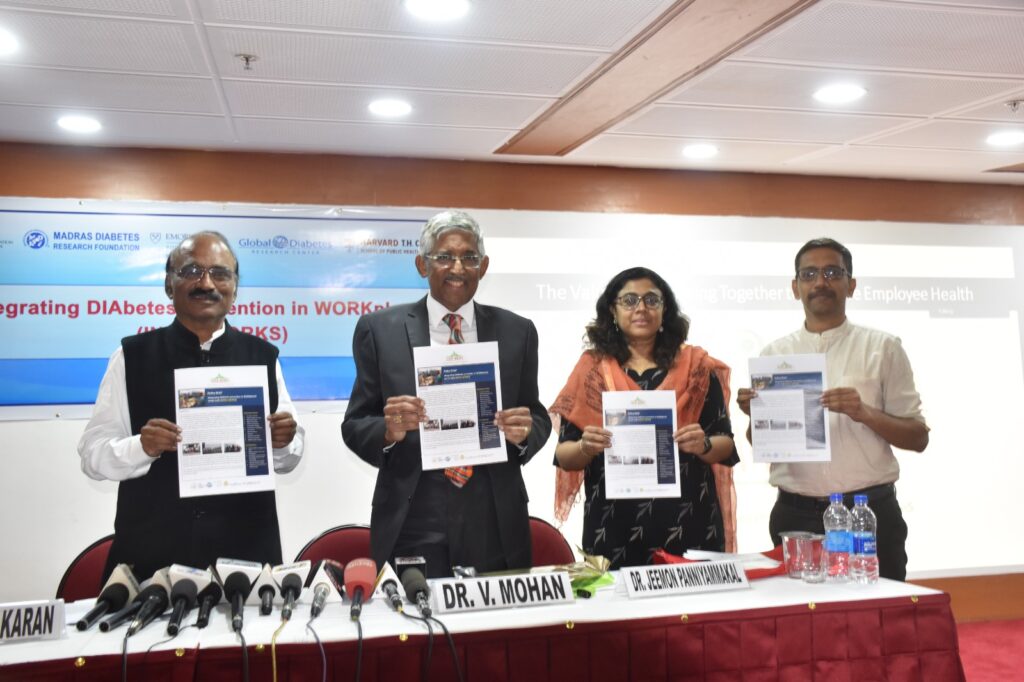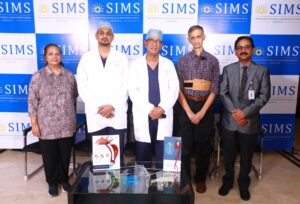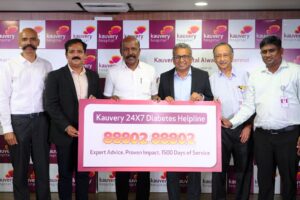National, July , 2023: The Public Health Foundation of India (PHFI) in association with Dr. Mohan’s Diabetes Specialities Centre and Madras Diabetes Research Foundation (MDRF), Chennai, Sree Chitra Tirunal Institute for Medical Sciences and Technology, Trivandrum, Emory University and Harvard University from the USA, today announced the findings of India’s first-of-its-kind in-depth corporate worksite report titled ‘INDIA-WORKS’ – Integrating Diabetes Prevention in Workplaces. Conducted over a period of six long years (2016-2022), which makes it one of the longest surveyed reports in the corporate world, the INDIA-WORKS report highlights the need for strategic health-based interventions at company worksites to ensure employees’ overall well-being through a structured lifestyle modification program, improving dietary quality, increasing physical activity levels, and promoting healthy food choices in worksite canteens.
The INDIA-WORKS research embarked upon assessing crucial parameters like HbA1c (3 months blood glucose average), waist circumference, blood pressure, blood cholesterol and weight at 11 diverse worksites in 5 states – Kerala, Tamil Nadu, Jharkhand, Chhattisgarh, and Odisha. Specific interventions for workers were undertaken by healthcare experts from PHFI and MDRF (India), Emory and Harvard (USA) who designed and implemented culturally appropriate lifestyle modifications, which resulted in startling outcomes in the field of NCD management at workplaces.
“Organized sector (large or medium-sized industries or offices) employees have the highest burden of chronic disease risk factors such as obesity, diabetes, and hypertension. There is substantial evidence that we can prevent these risk factors or control them if people have acquired these diseases already. The INDIA-WORKS program demonstrates population average reduction in cardiometabolic risk factors such as weight, waist circumference, blood pressure, and HbA1c.” – Prof. Dr. Prabhakaran, Executive Director, Centre for Chronic Disease Control, and Distinguished Professor at the Public Health Foundation of India.
‘The INDIA-WORKS program was implemented in 11 prestigious worksites across India, consisting of steel and manufacturing plants, locomotive industry, and refineries. The participating worksites through this program have now become torchbearers in creating healthier workplaces. They are also great examples of how management and employees can work together to prevent disease among workers and their families by making simple, practical, and sustainable lifestyle changes which begin at their workspace. Cumulatively, these positive changes can help reduce the future burden of diabetes and cardiovascular events which we see largely affecting our young working population, early in life due to stress and unhealthy lifestyles’ – Dr. V. Mohan, Chairman, Madras Diabetes Research Foundation & Dr. Mohan’s Diabetes Specialities Centre, Chennai.
“Culturally tailored and resource-sensitive programs on diabetes risk reduction, such as the INDIA-WORKS, have the potential to delay the onset of diabetes. In workplaces where the program is implemented with rigor and high fidelity, we see regression of glycated hemoglobin (HbA1c) values to the normal healthy level in employees at high risk of the development of diabetes”. – Dr. Jeemon Panniyammakal, Additional professor of Epidemiology, Sree Chitra Tirunal Institute for Medical Sciences and Technology, Trivandrum.
‘Despite the challenges of the COVID-19 pandemic, the INDIA-WORKS intervention improved the health of workers in India. This would not have been possible without the dedication of the worksite partners and the study team. INDIA-WORKS is a model for creating healthier worksites and can guide workplace health programming in India and globally’ – Dr. Mary Beth Weber, Associate professor of global health, Emory Global Diabetes Research Center, Emory University.
‘INDIA-WORKS sets a well-designed model for health promotion and cardio metabolic disease prevention at workplaces, where people spend substantial parts of their lives. The lessons learned from this project can be scaled across workplaces, small and large, and benefit the health of employees and their families and improve productivity and happiness at work’ – Dr. K. M. Venkat Narayan, Ruth and OC, Hubert, Professor of global health and epidemiology, Emory Global Diabetes Research Center, Emory University.
‘Building capacity at worksites for health promotion by training peer educators and educating management and staff on the importance of lifestyle education was a key component of the INDIA-WORKS program. This ‘train the trainer’ and ‘buddy system’ model was created to ensure the sustainability and scalability of the program at the INDIA-WORKS worksites even after the study ended’ – Dr. Ranjani Harish, Sr. Scientist Head, Department of Preventive and Digital Health Research, Madras Diabetes Research Foundation & Dr. Mohan’s Diabetes Specialities Centre, Chennai.







More Stories
SIMS Hospital Performs India’s First Combined Open-Heart Valve Replacement and TAVR Valve-Specialised Aortic Graft Surgery
Kauvery Hospital’s 24×7 Diabetes Helpline Crosses 1500 Days of Lifesaving Support Across Tamil Nadu
Apollo Cancer Centres Launches Dedicated Robotic Pancreatic Surgery Program